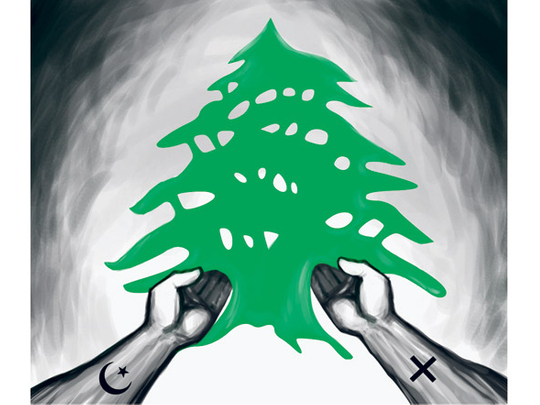
Earlier this month, an estimated 500 people were killed in ethnic clashes near the central city of Jos in Nigeria, as Christian and Muslim herdsmen launched reprisals against each other. Such killings are not limited to any geographic location and are often fuelled by social, economic or even territorial conflicts. Still, they take on an especially ugly form when conducted in the name of religious beliefs, which destroy the innocent and permanently scar survivors. What can be done to end ethnic and religious violence?
An answer may be just around the corner, originating in a small but very wealthy country, Lebanon, whose government decreed March 25 a unique national holiday. To be sure, while Lebanon may be known as the "Land of Milk and Honey," its 18 official sects have engaged in dreadful ethnic cleansing over centuries. In that sense, the Lebanese failed to create a nation, tolerating instead a complex and convoluted sense of their multiple identities. Successive leaders inculcated a variety of sentiments, some of which approached nationalism, though much of what passed for patriotism was xenophobic. National holidays filled yearly calendars as Muslim and Christian commemorations received a fairly balanced spread. Sadly, while these celebrations pleased the country's various communities, they seldom created a joint space that united citizens.
Today, the Lebanese will, however, observe the Annunciation of the Blessed Virgin Mary as a joint Christian-Muslim Day and though the commemoration is more of a national event than a religious one, its very creation might be an unprecedented event in contemporary history.
This is an immensely valuable step, affirmed by Prime Minister Sa'ad Hariri, who emphasised in his proclamation how the Virgin Mary influenced Muslims and Christians, as amply revealed in their respective scriptures. Indeed, the Quran devotes the 19th Sura to her, which is actually named Maryam (Mary in Arabic). Amazingly, the Virgin's name is mentioned more often in the Quran than in the New Testament and she is considered one of the most righteous women in both traditions. For Roman Catholics, Mary was conceived and born without "Original Sin," which made her sinless and immaculate from all forms of evil. In Islam, she is the virgin mother of Jesus and in certain passages, referred to as the Qanitah (submissive), Siddiqah (faithful), Raqiyah (prostrated), Tahirah (pure), Nour (enlightened), Waliyah (saintly), and Sa'imah (fasting). There are other names attributed to her as well.
More than a gesture
Given this unanimity on Mary's influence, the Lebanese decision to "celebrate the cultural and religious unity between Christians and Muslims," goes beyond the symbolic political gesture and must be assessed as such.
The man who first suggested the holiday was Shaikh Mohammad Nokkari, the general secretary of Dar Al Fatwa [House of Decree], who spoke about it during Annunciation celebrations at the predominantly Maronite Jamhour College a few years ago. Few actually believed that the gap could be closed with such ease, but it was and that fact alone illustrated how men of courage can transform their societies.
Remarkably, the initiative gained momentum after Hares Chehab and Mohammad Sammak, co-chair of the Islamic-Christian National Dialogue Committee, welcomed the initiative, as did former prime minister Fouad Siniora. Before long, a leading bureaucrat added his voice to Shaikh Nokkari's prayers, when Beirut Mayor Abdul Monhem Ariss responded positively to a request that envisaged the construction of a statue of the Blessed Virgin in front of the National Museum, to be surrounded by a crescent.
Professor John L. Esposito, who heads the Prince Al Waleed Bin Talal Centre for Muslim-Christian Understanding at Georgetown University, in Washington, DC, wrote in his most recent book, The Future of Islam, that "The Muslim world is not the only arena for change." He concluded "One of the great ironies of history is that despite our apparent development and sophistication, too often we are bound by our own cognitive and religious ghettos. As the examples of the former Yugoslavia, Northern Ireland, India, Palestine-Israel, America and Europe demonstrate, just because faiths exist in the same country or area, it does not mean that believers come to know much about the other's faith or respect each other."
Lebanon may indeed be such a place and it is remarkable that core principles and values like freedom of speech and of religion, which are espoused by the majority of its citizens, will now be enriched beyond description. Though many Lebanese will enjoy today as a vacation, many others will participate in religious ceremonies in chapels and mosques during which "Christians and Muslims will pray together to the Virgin Mary."
Naturally, this first joint "Christian-Muslim Day" opens a new page in the country's history, hopefully to impart on the Lebanese that the best way to address extremists on both sides of the spectrum is to rejoice at life itself. Importantly, this observance may also be an answer to ethnic violence, perhaps even act as a beacon of hope for people in Jos, Nigeria, as everywhere else, so that ordinary folks learn the real meaning of coexistence.
Dr Joseph A. Kechichian is a commentator and author of several books on Gulf affairs.









